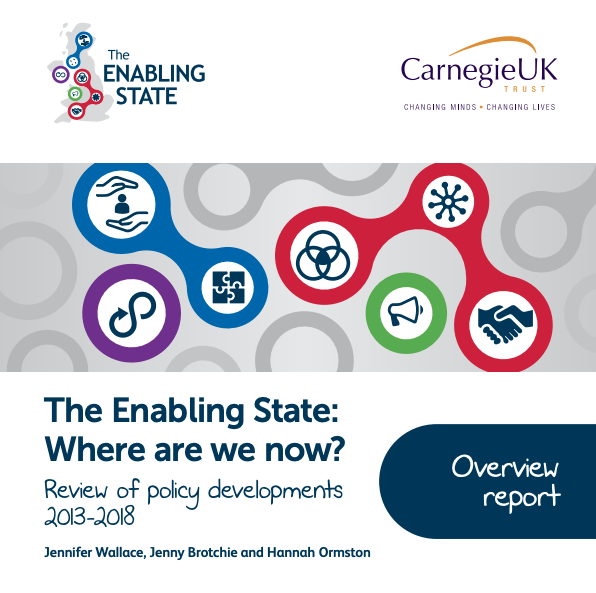An Enabling State: it’s time to recognise community power
Posted on 25 Jul 2019 Categories: Blog, The state we want, Wellbeing
by Hannah Ormston
Now, perhaps more than ever, our peer-to-peer interactions, social networks and relationships, matter. The importance of personal agency and control in the decisions that affect our lives should not be overlooked. Following the Brexit referendum in 2016, a significant proportion of the UK population feel unable to influence local and national decisions, yet participation and autonomy are fundamental to our wellbeing. The State has a responsibility to ensure that people are supported to fully engage and participate in ways that are meaningful to them – particularly pertinent in the times of turbulence and change that inevitably lie ahead. For over eight years, the Carnegie UK Trust has been working on research and development in this area, examining the shift from a ‘traditional’ welfare state to what we call the Enabling State.
The Enabling State is an approach to governance that takes a holistic approach. It recognises the value that people and communities themselves have, and their capacity to create real, transformational change – from the bottom, up to the top. Comprised of seven key principles – or policy shifts – it champions the strength of individual and collective autonomy and seeks to empower individuals and communities, in turn addressing stubborn inequalities in our wellbeing, and improving outcomes for people.
The seven interdependent policy shifts we identified are:
- From target setting to outcomes
- Top down to bottom Up
- From representation to participation
- From silos to working together/integration
- From crisis intervention to prevention
- From doing-to to doing-with
- From the state to community ownership and management.
In 2013, we reported that the UK was in the midst of a paradigm shift in public policy making; gradually moving away from ‘top down’ service delivery, towards models based on the principles of an Enabling State. Showing ‘green shoots’, the jurisdictions were gradually developing approaches and legislation more intrinsically collaborative in nature, such as around localism, community empowerment and coproduction. Individuals and communities were starting to be acknowledged as people with valuable ideas and insights to be shared, realised and acted on. So, five years on, what progress been made?

Although our assessment found that none of the UK jurisdictions are fully delivering on all of the seven shifts, there has been some promising progress, particularly in terms of the shift toward outcomes based approaches. A stocktake of overall progress showed that Scotland and Wales have seen more development than England and Northern Ireland in tackling democratic deficit and inequality by implementing legislation and practice that builds on the principles of the Enabling State. The introduction of ground-breaking legislation in 2015 – by way of the Well-being of Future Generations (Wales) Act 2015 and the Community Empowerment (Scotland) Act 2015 – demonstrates the commitment of both legislatures to empower people living in Scotland and Wales to take control of their own, their communities’, and (in the case of Wales) their future generations’, wellbeing. Both frameworks ensure that ministers publish progress against a shared set out outcomes that will guide priorities and decision making across the public sector and public sector services. To be truly transformative, the next key step for Scotland and Wales will be to link national outcomes to the budget process, streamlining the accountability landscape.
In England and Northern Ireland, there are clear ambitions for more preventative, collaborative, holistic policy making, but the shifts have not yet been achieved to the same extent. Universal preventative services have been cut and short term budgeting persists; both legislatures are still at a much earlier stage in their journey than Scotland and Wales.
At a local level, Northern Ireland has shown clear promise. Community leadership and local government play an integral part in their outcomes approach story, which has increasingly been delivering through the reform of local government and revised Community Planning Partnerships in 2015. In England, there are many similar positive examples at a more micro level, particularly around health and social care initiatives such as social prescribing, and the co-design of health care systems with communities more generally.
Yet there are still many gaps across all of the jurisdictions that will need to be addressed if the legislatures wish to properly put people and communities in the driving seat. Our assessment found that the scale of the budgetary and demand pressures facing public services are significant and ongoing and are, in many cases, hampering and undermining transformation. This is particularly evident at local authority level, demonstrating that whilst there is a strong sense of public support for a shift toward more community involvement in the delivery and management of services, real action is being prevented by financial pressures.
Local case studies have shown that people and communities have the power to create real, transformational change when the correct conditions are in place. It’s time for the UK Government(s) to ensure that these conditions are consistently in place.
To find out more about the Carnegie UK Trust’s Enabling State programme, please visit our website.
Hannah Ormston is Policy & Development Officer at Carnegie UK.
Want to keep up-to-date with more articles like this? Sign up to our newsletter.
Posted on 25 Jul 2019 Categories: Blog, The state we want, Wellbeing
